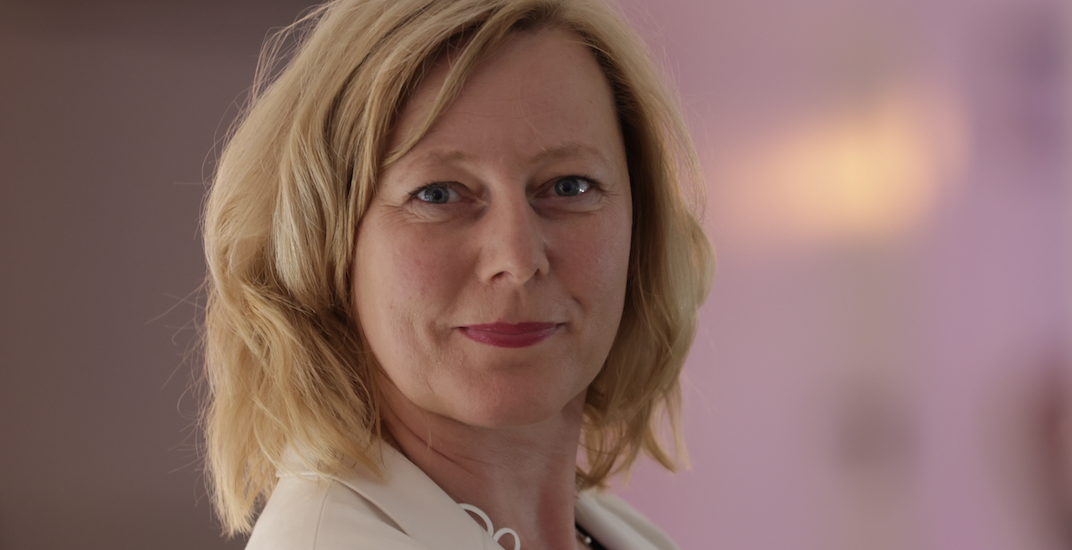
My vision is to shape an inclusive and diverse digital society
Gesche Joost is a Professor of Design Research at the Berlin University of the Arts, researcher, founder, political advisor and tech consultant. She serves on the executive board of the Einsteincenter Digital Future in Berlin. She runs a research lab (www.drlab.org) with her research groups at the German Research Centre for Artificial Intelligence, which specializes in human-computer interaction and wearable computing, and the Weizenbaum Institute in Berlin. From 2014 to 2018, she served as the German government’s Federal Internet ambassador to the European Commission. Since 2015, she has been a member of the supervisory board of SAP, ING and ottobock. From August 2022 until February 2023, she is visiting Digital Futures as a Scholar in residence.
Hi Gesche, since August this year, you have visited Digital Futures as a scholar-in-residence. What made you take on this opportunity?
– Digital Futures is a partner institution of the Berlin-based Einsteincenter Digital Futures, where I am sitting on the board. In Berlin, we started 4 years ago to build up a public-private-partnership structure with all 4 universities, Charité, Fraunhofer and others. We were able to create 50 new chairs on hot topics like Crypto-Currencies, Smart Water Management, Wearable Computing or Digital Health. When Digital Futures Stockholm started, I was eager to see how you are setting up this center, how you create a meaningful research community around digitalization, and what topics you would address. Therefore, I was quite happy when I saw your offering of a scholar-in-residence-position and instantly applied for it.
You focus on digital transformation and its implications on our society both in your research practice and at the policy level. Why do you find this so fascinating?
– Digital transformation affects us as a society on so many different levels and changes fundamentally how we interact with the world around us. We started this journey with a purely technological view on digitalization – and were fascinated by its potentials. With the rise of the Big Tech companies, we took a more economical look at the development – and saw great business opportunities. Now it is time to look at the sustainability – on an ecological and on a social level. Throughout the last years, we saw that the internet as our digital infrastructure is causing more social inequalities than we have expected it would.
I strongly believed in the early visions of the 1990ies – that the internet would give access to knowledge and resources to people all over the world and would lead to more equality. But it was naïve to believe that a technology as such could create more equality – it is also the social practices linked to it that we have to look at. My vision is to shape an inclusive and diverse digital society and look in my research into the prerequisites for this – on a practical level as a design researcher, and on political and social level as an expert and consultant.
2016, you founded Calliope gGmbH (www.calliope.cc), a non-for-profit organization offering digital learning to children. Tell us more about this.
– In 2015, I sat together with my husband and some friends, and we were envious of UK’s initiative for digital education: they launched the Microbit, a tiny little microcontroller for kids at school for learning how to code. First, we just wanted to import the Microbit to Germany – but then we started discussing that we should do an upgrade to it and develop a microcontroller for even younger kids – third grade, at the age of 8. This seemed necessary to us as many girls at the age of 12 or 13 in Germany start framing technology as something only for boys. Therefore, we wanted to start really early with a playful tool for kids at elementary school level.
It was clear that it should be Open Source, provide lots of fun teaching material as Open Education Resource, and be cheap. In 2016, we launched the Calliope mini, produced in Germany. We did a lot of fundraising to offer schools in all federal states of Germany a Calliope mini, including didactic material and training courses for teachers. Today, we have produced already 250.000 pieces. We launched a second version of it, and there are thousands of videos online where little girls and boys tell us how they learned to code – and e.g. built an alarm system preventing their siblings from stealing their chocolate from the hideaway.
Finally, tell us a little about yourself. What have you done in Stockholm so far?
– I love the Swedish nature and enjoyed the beautiful light in August and September when I came here. The best thing was when I realized that the apartment on campus, where I stay with my husband, is just 5 minutes by bike to Brunnsviken. We created our own “Swedish Triathlon”: We went there by bike, ran for a little while, and then went swimming in the beautiful “Brunnsvikens strandbad”.
Your scholarship ends in February next year – what has your experience been like so far, and what will you do next?
– It’s been a great experience! I met many inspiring people at KTH, Stockholm University and beyond and had good conversations on digitization. Jan Gulliksen is a perfect host and connects me to all the relevant people, and Kia Höök and her research group are amazing – and very close to the research I am doing at the Design Research Lab in Berlin. In December, we are planning a doctoral colloquium where some PhD candidates from my group are coming over to Stockholm, and we will do a 2-days workshop together. On December 13th, I will do a “Lecture and Hot Soup” event at Digital Futures, discussing an inclusive digital society and how we can achieve this together.


